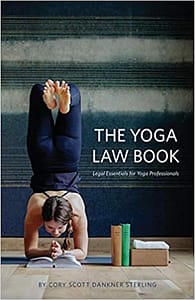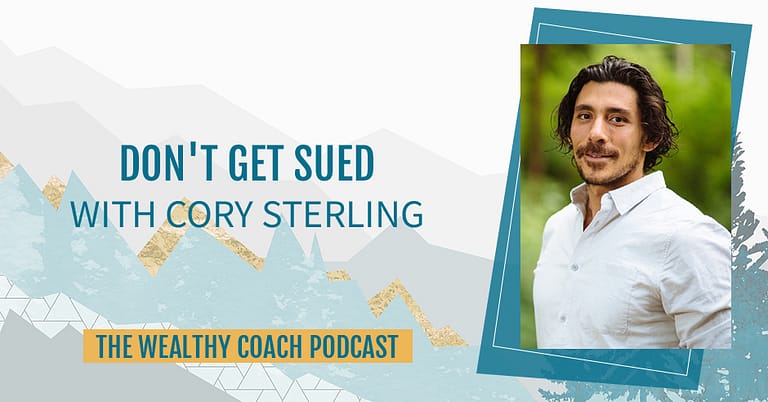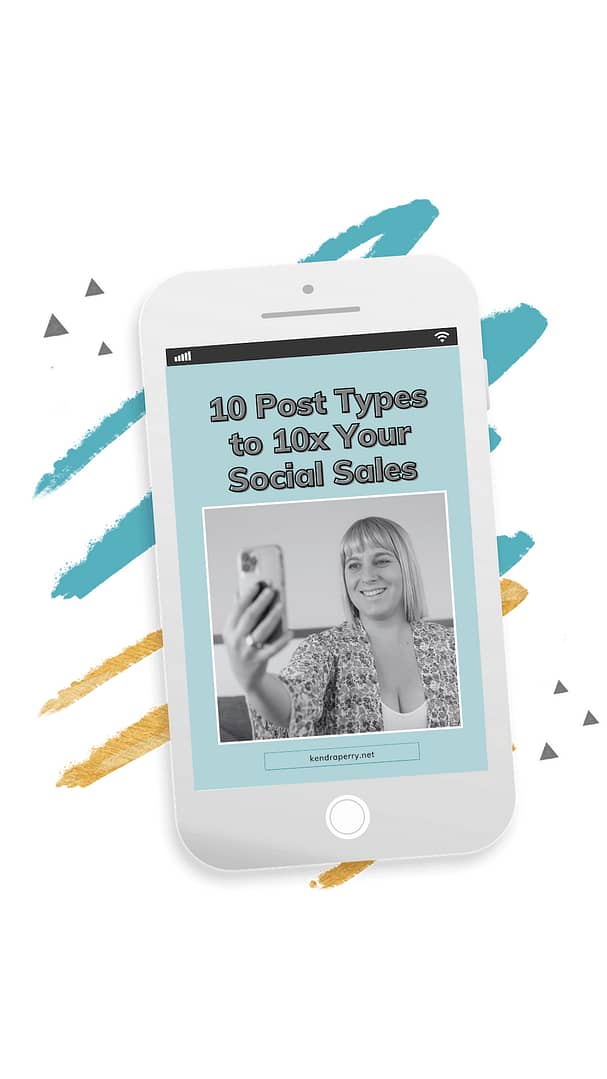Don’t get sued. That is a mantra that many business owners have, because a lawsuit can be a disaster, especially for a startup. In this episode, Kendra Perry discusses avoiding lawsuits with lawyer and partner at Conscious Counsel, Cory Sterling. Cory discusses why disclaimers and waivers are necessary and how to protect yourself legally. Tune in and learn more insights for protecting your business legally from Cory.
—
Listen to the podcast here:
Don’t Get Sued With Cory Sterling
Are you worried about getting sued? There are so many things you need to consider when starting a new business but the legal stuff can feel very overwhelming. Luckily, you can set yourself up for success right off the bat, in the beginning, to prevent future legal headaches down the road. In this episode, I’m sitting down with Lawyer and Founder of the Conscious Counsel, Cory Sterling, to help you get your legal affairs in order.
We will be covering the non-negotiable legal documents that every coach needs, things to consider when you work virtually with clients on Zoom, how the wellness landscape has changed and what to do. How to protect yourself from refund requests social media disclaimers and how not to get sued as a health coach.
Cory Sterling is the Founder of the heart-leading law firm Conscious Counsel, awarded as the Most Innovative Fitness and Wellness Law Firm in 2021. He has supported wellness professionals and coaches across the world with their legal agreements. As a lawyer, small business owner, fitness teacher and author of The Yoga Law Book, he has dedicated himself to the world of wellness and law.
He won the highest-rated session at The Mindbody BOLD amongst a field of the health and fitness leading minds and best presenters. He is the only lawyer who has completed the Mindbody Business Consulting program in order to learn overall best practices for studios. I know you are going to love this interview with Cory. You would think most lawyers are boring but he brings a lot of energy to the table. He is very funny and boisterous. I had so much fun doing this episode with him so let’s jump into it.
—
Cory, welcome to the show.
Thank you for having me. I’m so honored to be the first lawyer on the show. That’s the biggest honor. When I went into law school, I knew amazing things were going to happen to me but I didn’t know this amazing amount of things were going to happen to me.
You’re so enthusiastic and I would love if you could tell our readers a little bit about you and what you do because it seems like you support health and wellness coaches. Why are you focusing on that niche?
It’s been a bit of a road. It’s been a few years since I started my law firm called Conscious Counsel. The whole idea when I started was to be a lawyer operating and offering heart-leading law. I worked for a couple of other firms in Vancouver and I saw that the lawyers and clients were miserable. No one was having fun. It didn’t feel good and no one understood what was happening. I was like, “Why don’t I try to be a lawyer and a real person at the same time?” At that time, I was living in Vancouver. I was working as a group fitness instructor for a couple of different studios and gyms. I did yoga teacher training. I started a yoga festival. I’ve always been in the healthy scene. I had chlorophyll. Have you had chlorophyll?
I have not but I’ve had chlorella.
I’m into it. Chlorophyll tablets, multivitamins and all the things. The answer to why I’ve worked with health and wellness professionals is because it’s pretty much a pay-it-forward perspective in my mentality. It’s one area that I feel is underserved legally. A lot of health coaches don’t understand anything about the law and are operating at risk and they don’t realize that they are. They’re also doing good things, helping a lot of people and making the world a healthier place in a way that resonates with me. It was a natural fit to focus some of the efforts and services that we offer specifically to work with health and wellness professionals.

Many of my people are scared, especially when they’re new. They’re so nervous about the legal stuff and they’re always asking me questions. I’m like, “I’m not a lawyer. Go see a lawyer.” Now, I’m going to tell them to come see Cory. Let’s maybe start at the beginning. Let’s talk about what legal agreements coaches would need when they’re first starting out to make sure that they’re protected.
I’m going to answer that question, I promise you but I want to touch on the whole being scared thing. I’ve been doing this for years, which I feel old saying that. It’s been a lot of repetition of working with people and seeing a lot of people who are either first-time entrepreneurs or just starting to do something and just going out on their own. It’s amazing how the confidence from having all of the legal agreements in order. It’s a subconscious block beforehand where you’re like, “I want to grow my business but I’m not sure because I don’t have my legal in order. I’m not sure what risk I’m exposed to.”
For me, one of the coolest things about what I do is being able to offer that peace of mind and security because fear is a real thing. When you decide to become a health coach, they don’t give you a book where they’re like, “Here’s the pertinent information about accounting, legal and all of those related things.” It resonated with me when you mentioned fear in that particular way. That’s a great segue to what legal agreements health coaches and professionals need.
The answer is the starting point in the way that we make this real that all of us can understand is you want to think about the different relationships you have with the services you offer. If you go there, the law can seem like this big encompassing, challenging, stressful machine or it can also be something simple and palatable. The way that you start is thinking like, “What commercial relationships do I have? What relationships do I have in my business? If I’m offering services to people, I have a relationship with my clients.
If I’m renting physical space, I have a relationship with my landlord or a rental agreement. If I’m sharing my practice with someone else, maybe I have a partner or a collaborator.” Once you go through that, it sets the map for the different things you need to consider. That’s the guiding point of where you start. The small caveat I would add is don’t forget about your online relationships as a relationship that needs to be legally protected like who follows you on social media and what information you share.
If you’re doing lectures or giving information, be aware of that as well as collecting personal information. The waiver of liability, which I’m sure we’ll touch on at some point is also a big one because the service agreement you have is the relationship with your clients. A waiver is separate where they agree that in working with you, they will not hold you legally responsible for whatever happens to them. The answer to your question generally is to think about what relationships you have and who you work with and use that as a jumping-off point.
What are your thoughts on legal templates that you can download from Google?
I want to ask you that question.
I usually would not recommend them.
I would say ditto. In a lot of ways, the legal agreements are like a seatbelt in the sense that you don’t need it until you do. You can drive a long time without using a seatbelt. Nothing will happen and it could be fine but the moment that you’re going to need it and it has to support you and protect you, that’s when it counts. Just to answer that question also, I’ve been hired in a lot of cases to challenge legal documents. Usually, the bulk of my work is someone will say, “I’m a health coach. I’m starting my practice. Can you send me all the documents?”
I ask a bunch of questions, get to know them and what the goals are. I come up with the documents and they use them. You don’t have to worry about the law anymore. Sometimes people will be in the midst of an issue and they hire me to challenge something. “I suffered an injury here. This is the waiver I signed. Can you direct me on providing an opinion on what the strength of my case would be?” At that point, you do not want a templated legal document to be protecting you. You don’t need it until you do but when you do, it has to be professionally done and specific to you, your industry and your practice.
It seems pretty important. What my readers always come up against is they’re overwhelmed by the cost of everything. They’re always trying to do things cheaply. Based on what you’re saying here, it’s not something that you should be a cheap ass.
One of the most important lessons I learned about being a lawyer when I started, the day came when I became a lawyer and my mentor took me out for lunch and he’s like, “Cory, you’re going to tell your clients that they can pay you now or they can pay you later.” If you’re operating your business as an entrepreneur, especially in health and wellness, inevitably, there will be a moment when you interact with the law. At that point, what you want to have is proactive agreements.
You want to pay a lawyer at the start a more reasonable cost as opposed to putting it off, copying or borrowing someones. Two years down the line, when the issue comes up, instead of it $1,500 for the documents, now it’s going to be $15,000. All of your stress, attention and work, I’ve seen it, it’s ugly and it’s worth taking care of in my opinion.
That makes a lot of sense. That puts things into perspective. Why not spend $1,500 now versus $15,000 plus later? It seems like a no-brainer. Let’s dive into some of the online stuff like privacy policies and social media disclaimers. Can you speak a little bit about that? A lot of my students are starting their website or they’re beginning with their social media presence and what can they do in that case?
The first thing that you have to know is that there are specific rules about collecting personal information. The law is a little bit strange because a lot of the times it’s invisible. Something as simple as collecting emails, sharing an email list or holding on to personal information, especially working as a health coach, you would be like, “Give me all the emails and that’s great. I have a list and do all the things.” The government has very strict rules around what information you hold, how people can access it, if you’re sharing with third-parties and all of that stuff.
The short answer and the most important thing to know is your job is not to know all of the details of what should be in a privacy policy. Your job is to know that you need one. It’s the same with the social media disclaimer. The reason why a social media disclaimer is important is that by law, there’s something that’s called a duty of care. That’s the most legal term that I’m going to use.
What duty of care means is that if you’re facilitating an activity for someone else, the law establishes a relationship that says, “If you’re providing this information, leading someone in this activity or you’re making these recommendations or suggestions, you have to make sure that person does not suffer injury as a result of the information that you’re providing or sharing.” Instagram or Facebook Lives are strange because you have a platform and you don’t know who is listening and what they’re doing with the information you’re providing but technically that duty of care is still established especially as health coaches.

Everything with health coaches is more sensitive because you’re operating in unregulated fields. If it was licensed and there were regulatory rules around what can be said and what cannot be said and all of those things, it would be much simpler because then you can go on Instagram and be like, “This is why spirulina is the greatest thing ever. It’s going to change your pee. It oxygenates your blood from my understanding or it helps with that.” You could say something like that and get in trouble for it. Someone could follow a recommendation that maybe you innocuously say or make.
Technically, you’re responsible because you’re holding yourself out as a professional who may be qualified to speak about things when you’re not. If someone suffers an injury as a result, they would have a cause of action. I’m trying not to make it granular at all but applicable for everyone. In short, the social media disclaimer is important because you don’t know who’s listening but you are responsible for the things that you say. The last thing for health coaches and is important across the board as I said is you’re unregulated. It’s not always super clear what you can do and cannot do.
If you have a blog or you’re posting any information or client testimonials, you need all of that stuff protected because if someone suffers damages something happens or they feel like they were misled, they’re going to say, “This person’s talking about candida. I followed that and then I suffered these damages and they had a blog about how it would help or what the dangers are.”
What would that look like? Where would a social media disclaimer live?
The two places it lives are one, alongside your privacy policy and terms and conditions on your website, which is that footer. You go to any website and you’ll see on a footer, Privacy Terms, Conditions and Disclaimer. If you have on your social media a Linktree, it would be there. The whole point of all of these documents is you want something somewhere so that if someone’s going to say a claim of like, “I listened to you and I thought that you were a doctor. I thought you were a naturopath.” You have some form of proof to say, “If you looked on my website, I clearly stated ABC. As such, I’m not responsible and your allegations of misrepresentation are incorrect.”
Could it be done verbally? You mentioned Facebook Live or Instagram Live, could you say a brief disclaimer before you start chatting with your people?
You could but the nature of Instagram Live is that anyone can tune in whenever they want. You do it at the start. For example, we sell YouTube disclaimers because you have a channel and platform. There are fixed texts that will always be there so our clients use a disclaimer in YouTube text. As opposed to Instagram Live, in the first 25 seconds, you could be saying, “These are my qualifications. Only do if you’re healthy enough.” Someone tunes in to 27 seconds and they haven’t heard any of that.
Thanks for clarifying. What about Zoom? I know a lot of our people are doing this on Zoom.
The important thing for Zoom is that if you’re recording videos, you’d have to include Zoom in your privacy policy because technically, that information is shared with them, whatever information is being stored or held. It’s more for the waiver of liability that you need to include it. Waivers of liability are always about the activities and risks. Doing something in-person versus doing something on Zoom is technically a different activity and should be stated as such.
Are there any other things that coaches need to think about when it comes to COVID because that’s something that is pretty new in our world?
The big things for COVID are when they happen in person. If you’re doing things online, it depends on the type of coaching you’re doing. If you’re suggesting that people do certain things or take certain supplements or whatever it is, the answer is that it only matters in person and what you want to do is it would have to be included in your waiver of liability. To say like, “We’re doing this in person. This is an added risk.” As well as your service agreement. If you have a vaccination policy, you would choose to include it there. You could include any other related things as well in a service agreement. It’s more for in-person and typically, it’s the waiver of liability.
Are there any additional things that coaches would need to think about when it comes to them working with someone vaccinated since it technically is still something that’s in clinical trials? Would there be anything that they need to think about with that?
The simple answer for all of these things is to get documents done properly and you never have to think about this stuff. For example, if we did the documents for you, it would have all of the COVID stuff taken care of. Regardless of whether you’re vaccinated or unvaccinated, you’re coming in. This is our process. This is what we’re doing. You are released of liability. At that point, it doesn’t matter if they’re vaccinated or not. I’m all about practical law because I understand the health coach is not going to be like, “I want to learn everything about the law, study and get into it.”
Probably you want more clients and that’s what you’re focusing on. You want to be a better version of a coach so that’s what you’re focusing on. If someone’s vaccinated, would that change the documents? No. You need to have a procedure in place. You need to have people release you of liability. You’re not responsible for their vaccinations. As long as they assume the risk and you’re clear on what you said, it doesn’t make a difference.
In the questions you sent over, you mentioned the State of the Union and how the legal landscape has changed the coaching and wellness world. I’d love to dive into that because I don’t know how it’s changed because I’m completely ignorant.
It’s changed in a lot of ways, mostly because the way that services are performed has changed. That’s the big thing. Legal agreements should always be capturing the way that you offer your services. Because of the way that people are offering their services and the types of relationships they have, the legal documents need to catch up with that. The first thing that I said was like, “What are the legal essentials or what should need to be known?” The first thing is to think about the relationships and get documents for each relationship.
The next thing about how things have changed is to make sure that your documents reflect your current relationship and not a past relationship. What I’ve seen in working with my clients, everyone’s like, “I used to do things like that but now I’m doing things like this and now it’s changed.” I’m like, “Your agreements have to catch up with that.” An example would be if you have a membership and have some form of continuous revenue that you’re taking from people monthly. Consumer protection laws have shifted in the past twelve months around that.
Whereas before it was pretty relaxed and it wasn’t nearly as severe or intense as it is but because so many people lost so much money on tickets or things they purchased. Everyone is signing up for things online that typically are recurring revenues and charges. Governments are like, “We’re going to make things super strict and totally in favor of consumers.”
It’s happened a lot for me that coaches will sign people up, for example, a year-long program. It’s $20 a session or you can have unlimited sessions and it’s $2,000 for the year but you have to pay everything upfront. Now, the rules have changed so that if you’re taking an annual amount upfront, the cancellation and refund around that is different than if someone’s dropping and then paying one time.
If someone’s paying monthly versus annual, there are different rules.
The rules around paying monthly have changed too. The consumer protection rules around what you have to offer people in terms of a refund or cool-off period. Not all of those things were there before but a lot of them have come in. What I’ve seen a lot of my clients are shifting to is more of a membership-type basis and more group call-type basis. Whereas before, their practice may have been more one-on-one but because everyone’s doing everything through Zoom, everyone’s completely unaware of what a lot of these rules are and how they’ve changed. It sucks when I get an email from a client and they’re like, “This person wants a refund.” I’ve seen it where I’ll get letters from other lawyers or clients who are like, “It was a good account and they canceled. What can I do?” I’m like, “Show me the agreement.” The stuff’s not there. I’m like, “Sorry. You’ve lost.”
That’s good to know and probably something I should look into because I do have multiple memberships. I got some work to do.

If you don’t mind me asking you, what are some of those things? You say clients are asking about the law and you’re like, “I don’t know the answer.” Have you seen the same types of questions? Have you seen any new types of questions around different things?
A lot of it is in regards to what they can do in their state-specific because most of my clients are American and that’s always me like, “I’m Canadian. I can’t even begin to answer this question.” A lot of it is around that and what they can say. I work with a lot of coaches who are functional practitioners so they’re helping their clients with lab interpretation. There are a lot of questions around that as well.
I’m sure that those questions were always there. The other thing is intellectual property. We’ve seen more collaborative coaches where you do a joint workshop or you work with someone else, who owns the materials to what’s been created and that stuff is coming up too.
I would love to talk a little bit more about refunds because they’re stressful for people when they happen. I want to tell everyone that it’s normal to get refund requests. You can be the best coach in the world. Someone’s going to request a refund at some point but is there anything you can do to prevent refunds or have fewer refunds. Can you give any advice on that?
It all depends on the context and circumstance. When did they purchase? Did they enjoy any of the services? When are they asking for the refund from? How much of the refund are they asking? There are rules that will protect refunds irrespective. For example, they sign up for something and then the next day they wake up and they’re like, “I don’t want this. I’d like a full refund. I haven’t used any of the services.” That situation sucks but if you’ve provided the services to someone and then afterward they say that they want a refund, you need a good service agreement.
In that case, a person would not be entitled to a refund or they shouldn’t be subject to whatever’s written in the agreement. The general rule at law is that unless two parties cannot agree to anything which is illegal but other than that they can agree to anything. You can put in a refund clause to say, “Once the session is complete, you will not receive a refund and all sales are full and final.” Even when you purchase something online, there’s always a period that you have for refunds or if the goods are delivered and deemed not of a quality that you can use, that’s another reason why someone would be given a refund.
As a tip for everyone reading, you’re allowed to put administrative fees into your refunds. If you have a refund or cancellation policy and part of you is like, “I don’t want to give this person a refund or honor it.” So long as you have a service agreement that outlines these things, you could put something in like, “Every refund includes a $75 refund administrative fee.” There’s still something that’s salvaged and that can be a point of negotiation for whoever you’re dealing with.
That’s a good idea because when we process refunds, I have my assistant in there doing it so it does cost me money plus Stripe no longer refunds you their service fees when you refund. You lose the Stripe fee as well that you paid on the initial purchase. It would be great to have an admin fee.
I said 3%. I’ve been a Stripe guy forever.
PayPal is the worst.
I hate PayPal with such a passion. I refuse to do anything with PayPal. They’re awful. Thank you.
They held $30,000 of my money for two months in their little thing and wouldn’t give it back to me because they changed something. I was like, “Do you think I have $30,000 to make up for that somewhere else?”
I’m happy we’re on the same page about PayPal and also about Stripe. I’m still waiting to get an award from Stripe. Aren’t they one day going to be like, “You’re an awesome client? We appreciate it.” Stripe gives no recognition. Maybe I feel that I deserve something.
I don’t even get an email from them ever. I have one question regarding refunds because I see people out there who have a no refund policy. They say, “We don’t offer refunds under any circumstances.” Is that legal?
The answer is no. There are instances where someone can challenge that. This comes up a lot and I don’t think this applies to health coaches too much. Within the independent contractor realm, when you have a contractor working for you, a lot of bosses will put all of these provisions in an independent contractor agreement that won’t apply or that shouldn’t apply. They’ll still put them in because they’re like, “This person’s not going to hire a lawyer to see if it’s good or know if it’s legal or not in this state.” With refunds, it’s the same as a bad waiver. Someone can put no refunds under any circumstances but if someone wants a refund and legally they’re correct and the issue was to escalate.
They would say, “My state or provincial law says that I’m allowed to refund if the goods were not of reasonable quality. Here’s a photo of what I received that did not work.” Therefore ad law, it doesn’t matter that you have a no refund policy. Remember how two parties cannot agree to anything that is illegal. It would be illegal for someone to give away their consumer protection rights. That would be deemed illegal. The agreement as a whole could still stand but that provision would be cut out.
I was always wondering that because I’m like, “I like the idea of this no refund policy but this doesn’t seem legal.” I can’t imagine that people wouldn’t still come after you for a refund.
It depends on the amount and story. The answer to your question is how to deal with or offer less refunds? It’s all client management. It’s all the relationships that you have with people. There are times I’ve given refunds when people haven’t asked and I’ve not given refunds when people have asked but it’s all about managing the relationship with the client, explaining your position and finding how you can make things better for them. It’s an ongoing negotiation of that aspect of the relationship.
Let’s say, a health coach has been working with someone and then they get upset about something whether it’s legitimate or not and they start threatening to sue. What steps should the health coach take? Should they try to speak with the person, say nothing or get a lawyer? What would you recommend?
It depends on the specifics but there are different sensitivities and tactics that one could use or would use. That situation comes up quite a bit for me where I’m brought in as a peacemaker or someone to resolve. What I find in a lot of instances and I would say 80% of the time, bringing a lawyer in and showing that you take the issue serious enough. The client’s complaining, “I want all my money back. I’m going to sue you. This is terrible.” Don’t respond. As a general note for everyone reading, you want to be careful about the responses that you offer in writing because that will always come back to you.
There have been so many times where I’ve read through so many emails looking for that one golden nugget that would give us leverage in an argument or in a case. That can be the difference between tens of thousands of dollars or not. If someone’s temperamental and aggressive, stop. Don’t write anything. Speak with a lawyer someone who gets survived someone you feel comfortable with and then get the lawyer to respond on your behalf. What I found is in those situations when I step in, I’m not a super aggressive guy. That’s not my style. I’m professional but also courteous.
Usually, I come from other places, “I understand that you’re upset. My client has engaged me to speak with you. Why don’t you tell me a bit about the situation?” They’ll talk about it. It’s all about legal opinion. At that point, it’s all about understanding what your position is because a legal position is equivalent to putting a point on a map and understanding where you’re going. When you understand, “This person is correct. They are entitled to X amount of dollars or a full refund.” The way that you negotiate or deal with them is different.
If their claim is entirely frivolous, the way that you deal with it is different. The first step is fact-gathering then providing a legal opinion, understanding what your position is and then moving forward from there. The answer to your question is if you feel confident to do that, go forward and speak with the person yourself. Often, a lot of the tension gets released once a lawyer or lawyers are involved. My clients will call me hysterical and like, “This crazy situation.
I’m chilling. I have no emotional involvement and I also understand how these things typically work out. Bringing a lawyer in shows the other side that you’re serious and you’re willing to protect your position if that’s how you want it to be shown. The answer is that it depends but you want to feel it out and maybe it’s within your realm to repair or maybe you need help from a professional to repair it.
I have another question regarding online trolls and harassment. I’ve been in this situation a couple of times now where I’ve had someone harassing me online, sending repeat emails, doing crap on social media and coming after you for whatever reason. Are there any steps that coaches can take if they find themselves in that situation?
It can be a little bit challenging. The thing that health coaches need to understand is the difference between how the law functions versus the practical solution with a high percentage to result in a desirable outcome. Let’s go straight legal. Send a cease and desist. If they don’t do anything, file in the jurisdiction an injunction to deactivate the account, report to Facebook, Instagram or whatever you want to do. That’s going to be expensive and that’s going to take a long time to do.
Sometimes enlist a lawyer, show the other person that you’re serious, scare the crap out of them by writing things like, “The result of your actions is $27,000 in damages. If we have to pursue this matter, we will include all of our legal costs and fees, in the event that we win.” It’s unequivocal that you’re in the wrong and you take the position from there. It’s unfortunate that people are able to do that. You could get a restraining order if someone were to do that in person against you and you could meet all of the legal requirements. You want to manage it the best that you can. Having a lawyer on your team who can send out a quick email usually goes a long way.

I feel that that would normally scare people to have someone be like, “You’re going to be in crap.” A lot of these people they’re going to go away. That’s good advice. Anything else you could share with my readers that we haven’t covered?
Trademark is something to think about. It’s an issue that a lot of my clients come up with sometimes too late sometimes right on time. It’s something where you may not realize the rules and maybe you’re building a kick-ass brand that’s doing well and resonates with people. If you don’t register a trademark and someone looks at what you’re doing, sees that you don’t have a trademark and then registers their own and then, “Pay me now, pay me later.” The pay me later consequence of that is you can defend those rights and you’re able to do that but it’s expensive. It’s long. In the interim, you have the possibility of losing the use and then you’re going to have to register anyways.
It’s also important to consider that of like, “I want to have exclusive use and have legal rights that I can enforce it against others to demonstrate that this is mine and no one else is allowed to use it.” It also prevents someone else from stopping you from using your mark. It has happened for me that I have a client who has used something longer. Someone else registered the same trademark under their nose. They were just sleeping. They never registered. It was never brought to their attention. The trademark gets issued in favor of this other person. After years of work, they’ve had to change their website, all of their branding, materials and everything they’ve ever had. That situation sucks.
I do get a lot of questions about trademarks. Usually, I say like, “Yes but make sure you know you want to do this.” I get a lot of people where they’re like, “I want to do this,” and they changed their mind a few months later. Once you’ve started building it, it’s going well and you’re committed to it then maybe consider it. Would you say that’s advice? Am I leading my people astray?
The thing that I always say with trademarks is when you’re ready to marry it. When you’re ready to get married, you know that you’re doing it. It’s not like your second date where you tell a friend over coffee like, “I’m starting this new thing and this is what it’s called. Let me go run to the trademark registry.” Once you know that you’re going to be, “To have and hold in sickness and health,” then that’s a good time to register the mark.
How long does a trademark process typically take? Is it long?
In the United States, what I’ve seen before COVID, could be between 3 to 6 months. Now, it’s usually between 8 to 12 months. In Canada, it can be upwards of three years. They take their time. The thing to know is that it’s always a race to the registry. It’s all about who registers first because once you register first, what that means is you’re at the front of the line. Even if the person at the back of the line has better legal rights than you, you’re still going to get to go first. The obligation will be for that person to prove that they have better rights than you.
For example, they’ve been using the mark longer or before you but then you have to file actions. It costs money and it takes time. Again, you’re going to have to file anyways. Any defense of a mark that’s unregistered, part of the process in order to properly defend it is that you have to register anyways. It takes time. Let’s say there’s no adversarial opponent in the issue that you register. In Canada, if I register tomorrow, it’s like my certificate got issued on that date. It’s mine to lose until it happens. That’s why we encourage people to register once they know they’re married.
I’m a year into a trademark process and I’m like, “This is taking forever.” The Canadian government denied me. Now, we’re going through something copyright or I don’t know what’s going on.
What I always tell my clients about trademarks is you got to chill. Register and chill. Netflix and chill.
I like that you said that. I’m at the front of the line. Essentially, I’m holding onto it while we go through this process and that’s all good. Is there anything else we need to talk about?
I’m happy we connected on that PayPal point. People will always send me PayPal crap. I’m like, “I’m not paying this. I’m not doing anything through PayPal.” I don’t accept money through PayPal. I don’t pay through PayPal. It was very validating. People don’t understand me. They’re like, “What’s wrong with PayPal?” I’m like, “I hate PayPal.”
For bookkeeping and trying to track down, their dashboard where they collect all the invoices, it’s so confusing. Things always get lost in there. You have to manually put things into your count. Stripe does it for you. They collect it. It’s so much easier to use. I feel like PayPal is the worst.
This is a good day. I’ve been waiting for this day. It was in my vortex and now it’s finally manifested to connect on this point.
We’ve connected on PayPal and Nelson so we’re doing good.
That’s a great start. I feel good about this connection that we’ve got going.
If you could leave our readers with one powerful, potent piece of advice before we go, what would it be? I’m going to put you on the spot.
Operate your practice in a way that’s most meaningful to you and don’t look at what anyone else is doing. That’s the jam that I’m on because who cares how it’s been done. You know your clients and what people are looking for in working with you. Be the health coach that you would want to work with. If you can always stay true to that, great things will happen to you.
Focus on your own thing and forget about the rest.
Amen.
How can the readers connect with you if they want to stalk and work with you?
You better not troll. My dad said something to me like, “This person is trolling this person.” I looked it up in the dictionary and it was added not too long ago. It pulls in the dictionary in that context of following or harassing someone online. Our website is ConsciousCounsel.ca. We also have a website LawIsFun.com, we’ve recently launched, which is exciting. It’s an automated legal document service. My email is Cory@ConsciousCounsel.ca. Say hi, reach out and it would be wonderful.
Thank you for reading. I appreciate you hanging out with us. I will see you again. Same time, same place where I help you become wealthy.
Important Links:
- Conscious Counsel
- The Yoga Law Book
- The Mindbody BOLD
- Mindbody Business Consulting
- Cory@ConsciousCounsel.ca
- LawIsFun.com
- https://www.HeartLeadingLaw.teachable.com/p/dont-get-sued
About Cory Sterling






